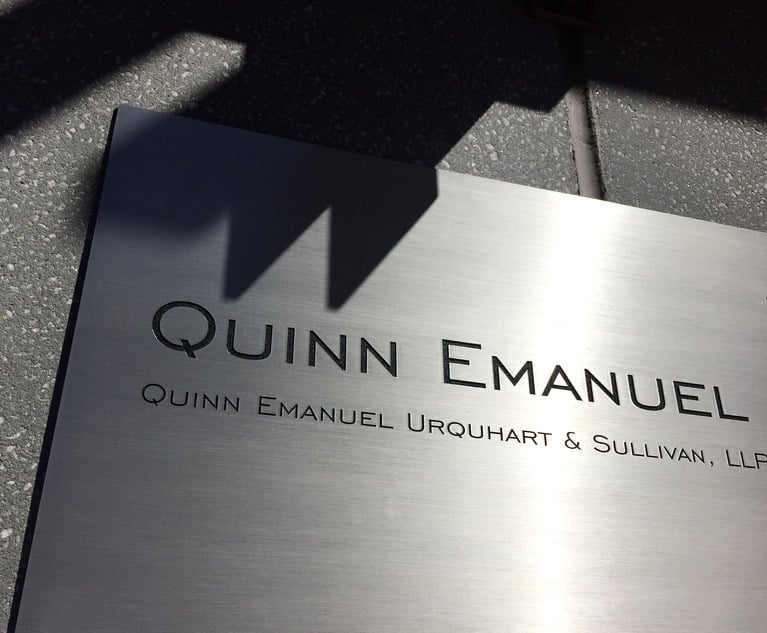Slaughters and Cravath team up for first time in blockchain guidance
Despite having a well known and long-standing relationship, the two firms had previously never published research together
February 25, 2019 at 04:13 AM
3 minute read
 Slaughter and May and Cravath Swaine & Moore have joined forces for the first time to produce a research and guidance note about blockchain technology.
Slaughter and May and Cravath Swaine & Moore have joined forces for the first time to produce a research and guidance note about blockchain technology.
The report, which offers "practical guidance" on creating blockchain and distributed ledger products that are GDPR-compliant, is aimed at privacy lawmakers and the wider industry.
New York-based Cravath, one of the world's top commercial law firms based on profit per equity partner, is historically one of Slaughters' closest US allies, alongside Paul Weiss Rifkind Wharton & Garrison and Wachtell Lipton Rosen & Katz.
The two firms have a relationship going back "many, many, many", years according to Slaughter and May partner Rob Sumroy. However, he said their collaboration on privacy issues is a more recent development.
Senior partners from each firm's intellectual property and privacy teams helped co-author the report, with Sumroy, Slaughters' tech and outsourcing head, and David Kappos, a senior Cravath IP partner, leading for each firm.
Sumroy said: "We pick these opportunities very carefully. This isn't a marketing pamphlet. It's taken months of research and analysis and significant time and effort, but we've done it because we thought we could do something unique."
Sumroy said the research can be used by UK and US lawmakers, especially as new privacy regulations emerge in the US and European lawmakers begin to issue guidance on how to comply with GDPR.
He also hopes that blockchain technology companies can use it to learn how best to design their products to be GDPR-compliant.
The two firms began working more closely together a year ago when clients began grappling with GDPR, according to Kappos.
Sumroy said: "It shouldn't be a surprise that a top US firm would be working with a top UK firm on something like blockchain. GDPR is a high point in privacy regulation, but the most significant investment in blockchain technology is coming out of US firms. It's a natural bridge between the east coast states and the UK."
Sumroy added: "When we're helping people in the US, we're doing it because firms like Cravath have the clients and are looking for a specialist in some European or UK legislation. We love doing it with Cravath because they're not on the ground in London competing with us. If their clients need help from us, we're there for them too."
Kappos said Cravath has been in talks with regulators in the UK and the US on privacy issues, and that it is an area in which the two firms will continue to collaborate, both in blockchain and other technologies such as AI – an area that Kappos said US Congress is showing a lot of interest in recently.
Sumroy agreed and said the publication of this paper "is not the end of the road" in their collaboration on blockchain and privacy issues, with Kappos adding: "We're not so much interested in the cryptocurrency aspect of blockchain, but we believe the enterprise and industry applications will continue to grow."
A short version of the report has been published, with a longer report planned for the coming weeks.
This content has been archived. It is available through our partners, LexisNexis® and Bloomberg Law.
To view this content, please continue to their sites.
Not a Lexis Subscriber?
Subscribe Now
Not a Bloomberg Law Subscriber?
Subscribe Now
NOT FOR REPRINT
© 2025 ALM Global, LLC, All Rights Reserved. Request academic re-use from www.copyright.com. All other uses, submit a request to [email protected]. For more information visit Asset & Logo Licensing.
You Might Like
View All
X Ordered to Release Data by German Court Amid Election Interference Concerns

Quinn Emanuel's Hamburg Managing Partner and Four-Lawyer Team Jump to Willkie Farr

Trump ICC Sanctions Condemned as ‘Brazen Attack’ on International Law

U.S.- China Trade War: Lawyers Label WTO Dispute Pointless, Clients Have Their Hands Tied
Trending Stories
- 1States Accuse Trump of Thwarting Court's Funding Restoration Order
- 2Microsoft Becomes Latest Tech Company to Face Claims of Stealing Marketing Commissions From Influencers
- 3Coral Gables Attorney Busted for Stalking Lawyer
- 4Trump's DOJ Delays Releasing Jan. 6 FBI Agents List Under Consent Order
- 5Securities Report Says That 2024 Settlements Passed a Total of $5.2B
Who Got The Work
J. Brugh Lower of Gibbons has entered an appearance for industrial equipment supplier Devco Corporation in a pending trademark infringement lawsuit. The suit, accusing the defendant of selling knock-off Graco products, was filed Dec. 18 in New Jersey District Court by Rivkin Radler on behalf of Graco Inc. and Graco Minnesota. The case, assigned to U.S. District Judge Zahid N. Quraishi, is 3:24-cv-11294, Graco Inc. et al v. Devco Corporation.
Who Got The Work
Rebecca Maller-Stein and Kent A. Yalowitz of Arnold & Porter Kaye Scholer have entered their appearances for Hanaco Venture Capital and its executives, Lior Prosor and David Frankel, in a pending securities lawsuit. The action, filed on Dec. 24 in New York Southern District Court by Zell, Aron & Co. on behalf of Goldeneye Advisors, accuses the defendants of negligently and fraudulently managing the plaintiff's $1 million investment. The case, assigned to U.S. District Judge Vernon S. Broderick, is 1:24-cv-09918, Goldeneye Advisors, LLC v. Hanaco Venture Capital, Ltd. et al.
Who Got The Work
Attorneys from A&O Shearman has stepped in as defense counsel for Toronto-Dominion Bank and other defendants in a pending securities class action. The suit, filed Dec. 11 in New York Southern District Court by Bleichmar Fonti & Auld, accuses the defendants of concealing the bank's 'pervasive' deficiencies in regards to its compliance with the Bank Secrecy Act and the quality of its anti-money laundering controls. The case, assigned to U.S. District Judge Arun Subramanian, is 1:24-cv-09445, Gonzalez v. The Toronto-Dominion Bank et al.
Who Got The Work
Crown Castle International, a Pennsylvania company providing shared communications infrastructure, has turned to Luke D. Wolf of Gordon Rees Scully Mansukhani to fend off a pending breach-of-contract lawsuit. The court action, filed Nov. 25 in Michigan Eastern District Court by Hooper Hathaway PC on behalf of The Town Residences LLC, accuses Crown Castle of failing to transfer approximately $30,000 in utility payments from T-Mobile in breach of a roof-top lease and assignment agreement. The case, assigned to U.S. District Judge Susan K. Declercq, is 2:24-cv-13131, The Town Residences LLC v. T-Mobile US, Inc. et al.
Who Got The Work
Wilfred P. Coronato and Daniel M. Schwartz of McCarter & English have stepped in as defense counsel to Electrolux Home Products Inc. in a pending product liability lawsuit. The court action, filed Nov. 26 in New York Eastern District Court by Poulos Lopiccolo PC and Nagel Rice LLP on behalf of David Stern, alleges that the defendant's refrigerators’ drawers and shelving repeatedly break and fall apart within months after purchase. The case, assigned to U.S. District Judge Joan M. Azrack, is 2:24-cv-08204, Stern v. Electrolux Home Products, Inc.
Featured Firms
Law Offices of Gary Martin Hays & Associates, P.C.
(470) 294-1674
Law Offices of Mark E. Salomone
(857) 444-6468
Smith & Hassler
(713) 739-1250








